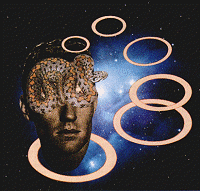 |
I hiss therefore I am
|
 |
Ramón Moliner wonders how philosophically inclined snakes would explain the Universe
WHAT are we to make of the fact that the Universe has
evolved the way it has, producing just the right
conditions for us to live in? One faction of cosmologists, including John
Barrow, Frank Tipler and Brandon Carter, argues that an
anthropic principle is at work: the
Universe must be such that it allows, and perhaps even favours, the presence
of human beings.
This notion may seem to be a return to the pre-Copernican view that humans
are at the centre of the Universe. The cosmologists deny this, and say that
many universes were initially possible, each with its own laws and physical
constants. But we live in the only Universe that turned out to be compatible
with our presence. They also try to word their view in the sense that "what
you see is what you beget". That is, if the world were not discoverable by
conscious beings, we would not be here to discover it. But the anthropic
principle, they insist, should not be equated with the belief in any
"cosmic purpose".
Such absence of purposiveness also seems to apply to biology.
Darwin hinted that humans exist, not because they
were the goal of Creation, but because nature has tried and discarded countless
evolutionary experiments. It seems that even in cosmology, some kind of Darwinian
selection can be invoked. One way to interpret the anthropic principle is
that some universes are more "fit" than others in being compatible with our
inquisitive presence. One of them was the "fittest" for us.
Most scientists dislike the notion of cosmic purposiveness. We may be happy
to assume an inventive principle in human affairs, but we cannot imagine
the presence of something in nature capable of "imagining" evolutionary
objectives. When people invent anything, they start out by having a
representation of what they want to improve, or the function that the invented
item will have. But we cannot conceive how nature could have a representation
or "idea" of the biological
characteristics that she "wants" to develop or improve. In fact, this could
explain why scientists feel so comfortable with the Darwinian theory of natural
selection.
Yet something nags at the back of the mind: the only way to make this view
consistent is to exclude humans from nature. If Darwin was right, either
humans continue to be an unsuspecting and non-foresighted product of past
interactions between mutations and natural selection, or things drastically
changed with their arrival. To build an aeroplane, the conscious brain of
a foresighted engineer is necessary. But, we are told,
nothing of the kind is needed
to create the gliding skill of an albatross:
blind natural selection will suffice.
Darwin's hidden message is that human creativity and inventiveness constitute
totally novel processes in the history of the Universe. It is not easy to
accept this hidden message, but it is equally difficult to propose a general
mechanism to account for both human and non-human inventiveness. Is it reasonable
to admit that the conscious intervention of humans represents a phenomenon
that was absent in nature prior to their advent? The age of the oldest human
civilisation is less than one millionth the age of the Universe. Do we have
to accept that during that fleeting instant something happened that had never
occurred before? That humans can achieve highly improbable feats thanks to
their capacity to plan ahead is self-evident. For example, two teams of workers
can start tunnels on opposite sides of a mountain and meet exactly in the
middle after months of drilling in the dark. Without foresight this would
be impossible.
Many cooperative adaptive features found in the living world are equally
amazing. Take the fangs of a viper, which have evolved with a canal inside
them; an adjacent gland that secretes the poison; a reservoir to store the
poison; a membranous duct connecting the reservoir to the canal in the fang;
an intricate osteomuscular system that erects the fangs before they strike;
an enveloping muscle system that contracts the poison reservoir at the right
time; a nervous system that sends the signal for contraction, also at the
proper time; and the instinct to use the fangs against prey and not against
mates.
It is easy to visualise how random mutations followed
by natural selection could lead to the right curvature of the fangs for better
grasping of prey. But what would have been the selective advantage of the
rest of the poison system if just one of its components had failed to evolve?
To claim that it can be achieved through unbiased evolution is like expecting
that nine independent miners can attack the core of Mount Everest from various
points at the foot of the Himalayas and meet exactly in the middle without
the guidance of a surveyor. If snakes could worry about cosmological issues,
I wonder how they would view the evolution of the Universe. They would probably
end up postulating an "ophidian principle" at work.
Lila: An Enquiry into Morals by Robert Pirsig p170
Those who rejected natural selection on religious or philosophical
grounds or simply because it seemed too random a process to explain evolution
continued for many years to put forward alternative schemes with such names
as orthogenesis, nomogenesis, aristogenesis or the
'Omega Principle' of Teilhard de
Chardin
[Ref:AOLQ&A2;[Maths3]
D.Zohar "The Quantum Self";Davis & Gribbin
"The Matter Myth" p302], each scheme relying on some built-in tendency or
drive toward perfection or progress. All these theories were finalistic;
they postulated some form of cosmic teleology or purpose or program. The
proponents of teleological theories, for all their efforts, have been unable
to find any mechanism (except supernatural ones) that can account for their
postulated finalism. The possibility that any such mechanism can exist has
now been virtually ruled out by the findings of molecular biology. Evolution
is recklessly opportunistic: it favors any variation that provides a competitive
advantage over other members of an organism's own population or over individuals
of different species. For billions of years this process has fueled what
we call evolutionary progress. No program controlled or directed this
progression. It was the result of spur of the moment decisions of natural
selection. |